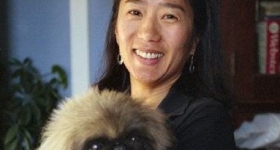The legal team that has fought Arizona's SB 1070 law. Photo courtesy of author.
In the summer of 2008, just a few weeks after Barack Obama secured the Democratic
nomination for President, the ACLU of Arizona offered me a job as a staff lawyer. The
work would primarily consist of suing the Maricopa County Sheriff’s Office and its
notorious leader, Sheriff Joe Arpaio, over the agency’s raids and immigration policies.
It was a tempting offer -- the situation was clearly bad -- but I was loathe to leave New
York City, where I'd spent my 20s hopping cafes and developing a community of friends.
After some mulling, my reluctance gave way, and by August I was in Phoenix looking
for an apartment.
My duty as a lawyer was to represent those who had been racially profiled by the local
police. Work was hectic and most of my clients were Latino, so I thought little about my
own race at the time. Arizona's Asian population was only three percent, after all.
But then, in 2010, the Arizona legislature passed SB 1070, one of the most extreme
iterations of xenophobia in our generation. This statute established “attrition through
enforcement” as the official immigration policy of the state and granted local police
extraordinary powers to investigate any person who looked or sounded foreign.
While Latinos certainly had reason to fear the new law, it soon became clear that SB
1070’s mandate would leave no minority group unscathed. Indeed, when our organization
and other civil rights groups sought to overturn the law, one of the key plaintiffs was Jim
Shee, a lifelong Arizonan of Spanish and Chinese decent who was stopped not once but
twice in the spring of 2010, and asked for his papers. Jim's wife Marian, a Phoenix-born
Japanese American, had been interned in Texas during WWII.
For the API community in Arizona, SB 1070 was a wake-up call. The “illegal
immigration” debate had evolved beyond the issue of who was coming across the
southern border to implicate more fundamental, enduring questions about who was “in”
or would be cast “out” of our society. Those who blended in with whites would be left
alone; those who stuck out would be subject to endless stops, interrogations and arrest.
Just as Marian had been interned as an "enemy" in wartime America, Latino day laborers
were being detained in Arizona, circa 2010, because they fit the profile of “illegal.”
Indeed, as part of a separate class action suit against Sheriff Arpaio, we submitted letters
that the citizens of Maricopa County had written to the Sheriff. These served as evidence
of animus against Latinos that the Sheriff, in an effort to appeal to his voters, had acted
on. In one letter, a citizen wrote that he feared residents would soon face “Spanish
language domination” and destruction of the “historical American way of life.” These
sentiments were eerily similar to those expressed by the senators who had backed the
Chinese Exclusion Act of 1882. Over a decade ago, law professor Jack Chin documented
how the 1882 Act had been informed by anxiety about racial difference and a perceived
threat that Chinese immigrants would, according to one senator, “expel[] the superior
race or reduce[] it to the ways, modes of life, and all the other conditions of the new-
comers.”
Then, last year, a handful of states launched a renewed attack on birthright citizenship,
the constitutional guarantee that persons born on US soil will be treated as US citizens -
- which was in fact settled over 100 years ago in a Supreme Court case involving a US-
born Chinese American cook in San Francisco. Reviewing the anti-birthright citizenship
proposals, I realized that I, too, would have qualified as an "anchor baby."
On the occasion of the ACLU’s 90th anniversary, I had the privilege of accompanying
Jim and Marian to Ellis Island, where Marian gave remarks about her childhood behind
barbed wire in an internment camp and Jim described his experience being profiled over
half a century later. Back in Arizona, I began to realize that the advocacy community
in Phoenix and across the country could no longer afford splintering or disunity.
Through multi-ethnic, multi-generational and multi-issue coalition work, we defeated the
birthright citizenship proposals (and many other anti-immigrant bills) in 2011.
We now find ourselves at a critical juncture. Just last month, the US Department
of Justice, after an extensive investigation spanning two and a half years, found the
Maricopa County Sheriff’s Office to have engaged in a pattern and practice of racially
profiling Latinos. A week later, a federal court enjoined the Sheriff''s Office from
detaining Latinos solely on suspicion of being undocumented. At the same time,
unfortunately, states like Alabama, Georgia and South Carolina are following Arizona’s
example and have enacted their own SB 1070 copycat legislation.
As we head into another presidential election year, Obama has a challenging road ahead
of him on immigration. While the administration’s promises of prosecutorial discretion
may mitigate the harshest aspects of our immigration system, the list of opponents to
dragnet programs like Secure Communities continues to grow. Meanwhile, the Supreme
Court has granted certiorari in the federal government’s challenge to SB 1070. The legal
arguments in the case are about the proper role of states in immigration enforcement, but
as with the other efforts to isolate and exclude particular groups in our nation’s history,
something greater is at stake. Decisions such as this define us as a people, as Americans:
will we embrace pluralism and our stated commitments to civil and human rights, or will
we retreat to segregation and fragmentation?
Annie Lai is a Clinical Teaching Fellow at Yale Law School and former Staff Attorney
for the ACLU of Arizona. She is the daughter of Chinese-Indonesian and Taiwanese
immigrants and graduated from Duke and NYU School of Law.









Comments